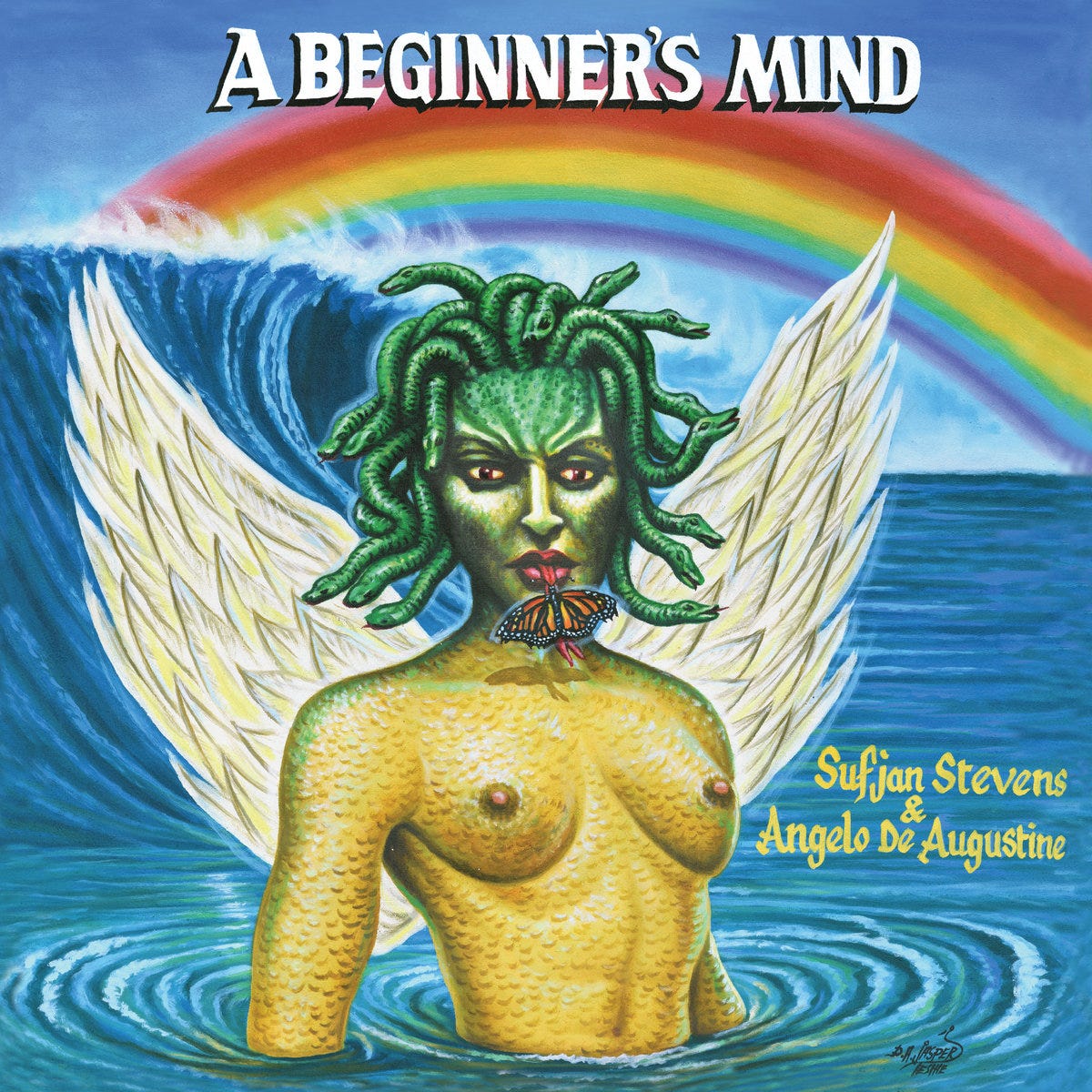Sufjan Stevens and Angelo De Augustine Look to Classic Films for Inspiration on Their Haunting Album, A Beginner's Mind
The prolific indie fixture continues to mine heartfelt gems no matter the topic
If you enjoy this review, why not share or subscribe to Check This Out! to receive fresh tunes to your inbox twice-weekly?
Sufjan Stevens is about as close to a household name as indie music gets. It’s been more than twenty years since Stevens released his debut record and formed Asthmatic Kitty Records, yet he continues to find new ways to present his music.
For his latest, Stevens has teamed up with Angelo De Augustine, a softly spoken protegé from his label, for fourteen songs loosely inspired by films of familiarity for most. A Beginner’s Mind takes these cinematic influences and uses them to explore themes of life, death, and what it means to be human in chaotic times.
The pairing of Sufjan Stevens and film seems like a natural step for someone who was earlier in his career known as “the guy making an album for each of the fifty states.” Like many folks, I first came across Stevens when he was on his third record, a tribute to his home state, Michigan. A lofi indie record that somehow reached Technicolor heights, Michigan (full name Sufjan Stevens Presents… Greetings from Michigan, the Great Lake State) was a widescreen folk record full of vignettes often named after towns that told intimate stories over a cacophony of instruments.
Still my favorite “Sufjan” record, Michigan was to be the first in Stevens’ series exploring all fifty states. Whether it was ever a serious notion or not, Stevens most likely realized the steep task early and followed up with the also excellent, Seven Swans, which used Bible stories as the basis for the record. Two years after Michigan, Stevens returned to the fifty states with Illinois, his most critically and commercially successful record, which is still the only other state to be explored.
Since, Stevens has continued to reinvent himself almost every record, whether surprising everyone with the heavily electronic The Age of Adz, or Planetarium, the solar system inspired record with Bryce Dessner of The National. It’s his indie-folk approach that usually finds Stevens success, though, and A Beginner’s Mind is his first record returning to this sound since Carrie & Lowell which was consistently ranked as one of the best records of 2015. While Carrie & Lowell was a fantastic outing, it was also a somber affair, and I’m already finding myself wanting to return to A Beginner’s Mind more due to the latter’s playful spirit.
For this record, Stevens and De Augustine retreated to a cabin in upstate New York where they would watch a movie and then quickly write and record the resulting song. Both took turns writing verses, choruses, and the chord progressions that make up the album for a genuinely collaborative effort. Hence the album’s title borrowed from the Zen Buddhist idea of seeing everything as if it was the first time.
Some of the influences are obvious, like the insanely catchy “Back to Oz” or “Fictional California,” which references the title of the campy Bring It On Again in the lyrics. Elsewhere, “Olympus” explores the 1981 version of Clash of the Titans and the legend of Perseus and finds Stevens working in harmony with another Oz callback in “there’s no place like home.”
One of the most satisfying things about this collaboration is Stevens and De Augustine’s knack for making gorgeous songs from horror movies of high and low brow variety. “You Give Death a Bad Name” examines the in-between state of zombies in Night of the Living Dead and fits in perfectly with the record’s continual theme of dark lyrics over beautiful music that is more whimsical than the subject matter should suggest. “(This Is) The Thing” looks to John Carpenter’s classic, The Thing, and uses the extraterrestrial life form that mows through research personnel at an Arctic base as a metaphor for social paranoia. “This is the thing about people,” Stevens sings. “You never know what’s inside, somewhere in the soul there’s a secret, hysteria grows where it was invited.” Even Pinhead and Buffalo Bill are an inspiration with the haunting piano piece “The Pillar of Souls,” inspired by Hellraiser III: Hell on Earth, and “Cimmerian Shade,” exploring the transphobia of Silence of the Lambs, whether made intentional by the director or not (“fix it all, Jonathan Demme”).
While there is a varietal horror theme throughout, the two best tracks on the record couldn’t be further apart in inspiration. “Lady Macbeth in Chains” is based on Bette Davis in All About Eve, an examination of an aging Broadway star. The chorus's melody will be stuck in your head for days as Stevens and de Augustine sing in rounds. For the delicate title track, it’s Katherine Bigelow’s surf classic Point Break with references to Patrick Swayze’s Bodhi and the bank robbers’ masks with “an ex-president, L.A. sure has been changing, living off the last of my loot.”
After listening to Sufjan Stevens all of these years, I’m always sure to go into each new album without expectations. While he usually hits the mark, it’s been many years since I’ve truly enjoyed an entire Sufjan experience (Illinois and its b-sides record The Avalanche were the last time I found myself endlessly listening). Still, A Beginner’s Mind may have changed that. The inclusion of Angelo de Augustino and not overthinking the recording process have worked for the best for Stevens on the outing, leading to a sense of playfulness that has been absent for some time.
A Beginner’s Mind is available now on Asthmatic Kitty.





